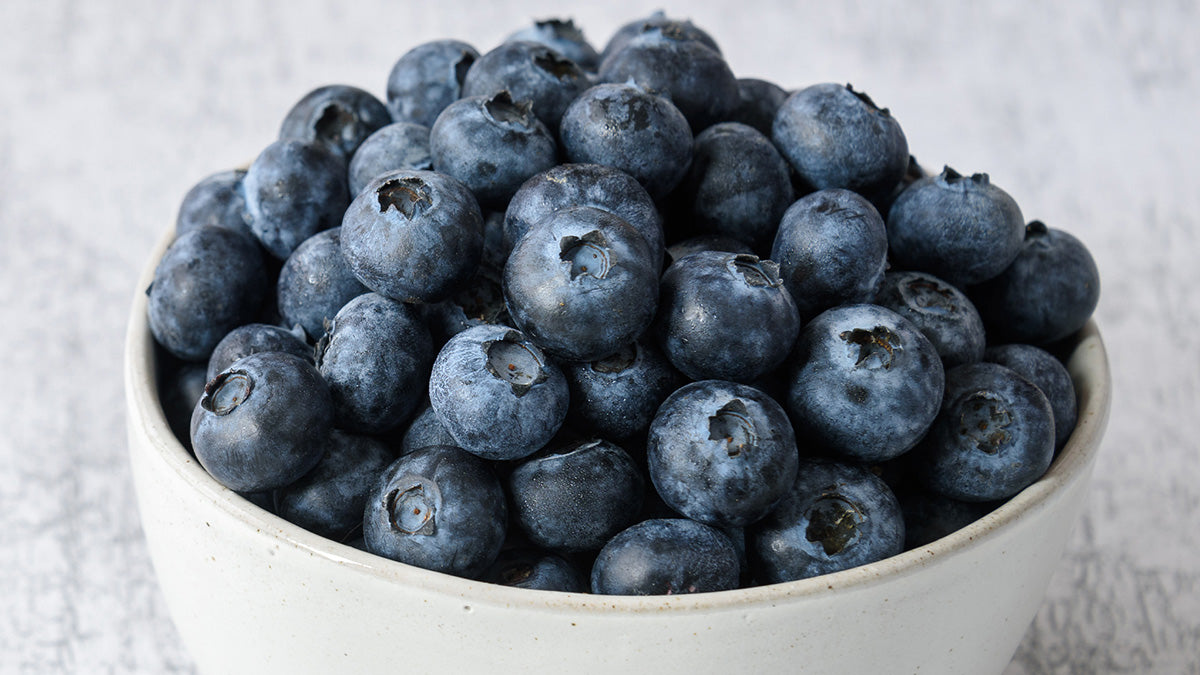If you’ve ever wondered whether dogs can eat blueberries, the answer is yes — and they may even benefit from them. These small fruits are packed with antioxidants, vitamins, and fiber, making them a nutritious low-calorie treat. In this article, we’ll explore the health benefits of blueberries for dogs, safe serving sizes, and what to avoid when adding them to your dog’s diet.
Can dogs have blueberries?
Blueberries are not only safe for dogs, but they can also be a great addition to their diet. Often referred to as a “superfood,” blueberries are rich in vitamins, minerals, antioxidants, and fiber. According to the United States Department of Agriculture (USDA), 100 grams (around 3.5 ounces) of blueberries contain:
- 57 calories
- 2.4 grams of dietary fiber
- 9.7 mg of vitamin C
- 19.3 µg of vitamin K
- 77 mg of potassium
Blueberries also contain many other essential vitamins and trace minerals, along with significant levels of antioxidants such as anthocyanins, which are also responsible for the fruit’s deep blue color.
Health benefits of blueberries for dogs
Blueberries are more than just a sweet bite. Research shows they can support dogs in several ways:
-
Antioxidant protection
The anthocyanins found in blueberries help with joint stiffness, and they slow cognitive-decline. They work as natural antioxidants, protecting your dog’s cells from damage and keeping them healthy. -
Digestibility and palatability
Most dogs love blueberries, plus they are also easy to digest. In a 2025 study, researchers at the Universitat Autònoma de Barcelona, Spain tested wet diets for Beagles with and without blueberries. The dogs consistently chose the blueberry diet, what researchers call palatability — the taste appeal of food to dogs. Just as important, adding blueberries didn’t negatively affect digestion — they absorbed and used nutrients just as efficiently as the dogs that didn’t eat blueberries.
Even more interesting, the dogs that ate blueberries had lower levels of creatine kinase — an enzyme that increases with heat stress. This suggests blueberries may help protect dogs from heat-related stress, though more research is needed to be sure. -
Support during exercise
Blueberries help dogs recover from heavy activity. For very active dogs, exercise puts a lot of stress on the body. That’s where blueberries may offer an extra boost. In 2006, a research team at the University of Alaska Fairbanks published a study on sled dogs — highly active working breeds such as Huskies and Malamutes, trained to pull sleds in cold climates. They found that adding blueberries to the dogs’ diet increased the antioxidant capacity of their blood after intense exercise. -
Cognitive health in older dogs
As dogs get older, it’s common to see changes in memory and learning, much like in people. Blueberries may play a role in keeping their minds sharper for longer. In a 2017 study published in the Journal of Nutritional Science, senior Beagles were fed a diet enriched with blueberry extract for 75 days. The supplemented dogs performed better on memory tasks than those on the regular diet. The researchers linked these improvements to changes in antioxidant-related genes, suggesting that blueberries could help protect brain cells and support healthy aging.
Taken together, this adds to the growing body of evidence that blueberries are not only safe but may also support long-term health; reducing oxidative stress, aiding recovery, and helping dogs stay mentally sharp as they age. Studies in people show similar benefits, which is why blueberries are now widely recognized as a functional food with potential advantages for both pets and people.
“Blueberries are a safe, low-calorie treat for dogs, packed with antioxidants that support immunity, brain health, and overall vitality.”
Dr. Lea Engelman, DVM
How to safely feed blueberries to your dog
Blueberries are an excellent treat — and like with any treat, moderation is key. According to the University of California Davis’s School of Veterinary Medicine, treats and extras should make up no more than 10% of a dog’s daily calorie intake to keep a diet balanced. Blueberries fit perfectly within this guideline because they are naturally low in calories. Let’s go over the healthy and safe ways to add this delicious and beneficial snack to your dog’s diet.
Which blueberries are best for dogs?
You might be wondering: what’s the best way to share this sweet, healthy treat with your furry friend? Here’s how to do it right:
- Fresh blueberries: These are the top choice for most dogs. Wash them thoroughly and serve them whole. They’re naturally low in calories, full of antioxidants and nutrients, and make an easy, bite-sized snack.
- Frozen blueberries: Just as healthy as fresh, as long as they’re plain and free of added sugar or preservatives. They’re especially great in the summer — cool, crunchy, and refreshing. Many pet parents like to keep a bag in the freezer for a simple, low-calorie treat that helps dogs beat the heat.
How many blueberries can a dog eat?
Here’s a simple guide by dog size:
- Small dogs (under 20 pounds): 2–3 blueberries per day
- Medium dogs (20–50 pounds): 4–6 blueberries per day
- Large dogs (over 50 pounds): up to 10 blueberries per day
It’s best to start with just a few berries, especially if your dog has never tried them before, since too much fiber at once can cause loose stools. Too much of even a healthy food can upset your dog’s stomach.
Feeding tips for blueberries
Beyond being a healthy snack, blueberries can also be used as part of your dog’s training and enrichment, as long as they have been washed to remove dirt and pesticide residues. Here are a few safe and easy ways to serve them:
- As a treat or reward: Offer a few berries by hand as a treat or training reward.
- As a food topper or part of a meal: Mix fresh or frozen blueberries into your dog’s regular food for extra flavor and variety. You can even crush the berries with a fork and mix under the food.
-
As a refresher on hot days: Freeze blueberries inside a Kong or other treat toy to create a cooling enrichment activity on hot days.
Recommended Reading

Can Dogs Eat Cranberries? Health benefits and potential pitfalls
Cranberries are everywhere these days: mixed into salads, baked into breads, and adding a bright touch to seasonal meals. While cranberries are...

Can Dogs Eat Strawberries? Nutrition facts and common concerns
Loved for their bright red color and sweet flavor, strawberries show up in everything from smoothies and salads to baked treats. On...
Which dogs should not get blueberries?
Every pet is different, with their own health history and sensitivities. While blueberries are safe for most dogs, pets with conditions such as diabetes, kidney disease, or food allergies shouldn’t have new foods added to their diet without guidance. That’s why it’s always best to check with your veterinarian or pet nutritionist before introducing blueberries or any other “people food.” They can give you advice tailored to your dog’s size, age, and overall health, helping you avoid potential problems and keep your pet on a balanced diet.
Can dogs eat human foods with blueberries?
Processed blueberry products are not recommended for dogs. Let’s break down a few of these popular blueberry items.
- Blueberry muffins or pies: Not recommended for dogs. These products are often high in calories, sugar, and fat. Shop-bought versions may also contain sweeteners, chocolate, or other ingredients that are potentially toxic to dogs. Even homemade versions are best avoided.
- Blueberry jam or spread: Typically, very high in sugar and should not be given to dogs. Be especially careful with products suitable for diabetics. These may contain sweeteners like xylitol (see label below). Even small amounts of xylitol are highly toxic to dogs. Ingesting xylitol can cause dangerous drops in blood sugar and, in severe cases, liver failure and even death.
- Blueberry yogurt: Typically contains sugar or sweeteners and lactose, which can upset a dog’s stomach. Unsweetened plain yogurt is safe in moderation.
- Yogurt-covered blueberries: Similar concerns as blueberry yogurt. Added sugar increases caloric content. Safe only in very small amounts if xylitol-free.
- Chocolate-covered blueberries: Unsafe for dogs due to chocolate toxicity. Should be avoided completely.
- Canned blueberries: Should be avoided if packed in syrup or sweetened. Added sugar and preservatives can upset digestion and contribute to weight gain.
- Blueberry supplements: Only use supplements formulated specifically for dogs and prescribed by your veterinarian. Human supplements may contain unsafe ingredients and/or concentrations.
- Blueberry candy, jellybeans, gums, etc.: Do not give to dogs. These products often contain high levels of sugar or sweeteners which can be harmful or even toxic.
- Trail mixes with blueberries: Many contain raisins, chocolate, or nuts, which are toxic to dogs. Should be avoided.
- Blueberry fruit bars: High in sugar and calories, not suitable for dogs.
- Dried blueberries: Best avoided unless entirely free of any additives. The drying process concentrates sugar, making them higher in calories, and many dried varieties contain added sweeteners or preservatives, which range from unhealthy to potentially toxic for dogs.


Blueberry jam sweetened with xylitol (Source: Nature's Hollow Blueberry Jam)
Conclusion
Blueberries are a safe and nutritious choice for dogs, offering antioxidants, vitamins, and fiber in every bite. When served fresh or frozen and in moderation, they make a healthier alternative to many processed treats. Whether used as a snack, training reward, or meal topper, blueberries are a simple way to add joy and natural nutrition to your dog’s diet.















